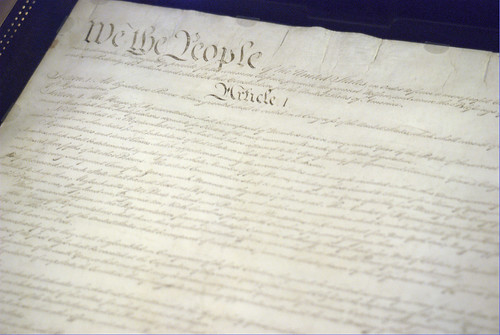 232 years ago, or, perhaps I should say, 11 score and twelve years ago, our forefathers wrote a Declaration of Independence, intended to separate us (the Americans) from the British government. That separation required considerably more than just a piece of paper, but we gained our independence. I would imagine that the British didn’t put up as much of a fight as most Americans presume, believing that we would find being on our own more difficult than anticipated and end up petitioning for reconciliation.
232 years ago, or, perhaps I should say, 11 score and twelve years ago, our forefathers wrote a Declaration of Independence, intended to separate us (the Americans) from the British government. That separation required considerably more than just a piece of paper, but we gained our independence. I would imagine that the British didn’t put up as much of a fight as most Americans presume, believing that we would find being on our own more difficult than anticipated and end up petitioning for reconciliation.The words of that document are, to say the least, interesting, even to people outside the United States of America. One sentence in particular: “We hold these truths to be self-evident, that all men are created equal, that they are endowed by their Creator with certain unalienable Rights, that among these are Life, Liberty and the pursuit of Happiness.” The Declaration was printed in “The Gentlemen’s Magazine” in London, in the August 1776 issue. The September Issue of that magazine took issue with those words quoted above, on the grounds that government, in and of itself, was an abridgement of liberty, and that even if the Americans intended to disestablish government, they should no signs of abolishing slavery. Certainly the slaves had as much right to liberty as the ‘freemen’ of America. The Gentlemen’s Magazine was at least half right. Government can abridge liberty, or it can protect it. Unfortunately, what one man sees as an abridgment of his liberty, another man may very rightly see as the protection of his own. In retrospect, there can be no doubt that if our founding fathers had truly believed that all men were created equal, they should have abolished slavery. Unfortunately, many of our founding fathers did not truly believe that. Some represented regions of the country where slavery was an integral part of the economy, and abolition would have led to financial ruin for many. It was widely believed that, as a young nation, we needed to be strong, and we needed very much to be united. Benjamin Franklin once said that we must hang together, or we will surely hang separately. Unfortunately, those who believed strongly that slavery should be abolished, also believed that they needed those who insisted that slavery was necessary.
When the Constitution was written, there was a compromise made, to appease both the abolitionists and the slave-owners. This has become known as the three-fifths compromise, and some people say that the Constitution says that blacks only count as three-fifths of a person. This is erroneous. The Constitution actually does make any distinctions as far as race or color. The situation at hand was that the slave-owners wanted their representation in Congress (specifically the House of Representatives) to be determined by their state’s total population (including slaves). The abolitionists, of course, objected, since the slaves would have no say in who their elected officials would be, therefore, clearly those elected officials would not be representative of the slaves; additionally, some of the slave states had more slaves than some of the other states had freemen, thereby skewing the power in Congress towards the slave states (not that there were really slave states or free states at that time, but some states had heavy populations of slaves, while others had very few, if any). The abolitionists then countered that slave owners should have to pay more taxes, based on the number of people living on their property. The three-fifths compromise actually very judiciously avoids the use of the term ‘slave,’ but says that “other persons” (other than free men, women that paid taxes, and Indians that did not pay taxes) would be calculated at a rate of three-fifths for determining a given state’s representation in the House of Representatives. To suggest that the three-fifths compromise refers specifically to African-Americans would be to suggest that our founding fathers were unaware that there were free men of color in 1776. I think that they knew that.
In any case, we have come a long way since then, and we still have a ways to go. We have abolished slavery, but many of our citizens are still finding their human rights abridged. It would be easy to point fingers at other countries, and there are some governments that have very little respect for human rights, but we need to clean our own house first, before we tell other nations how to govern themselves (not that we don’t already, but that’s another story). If we set the example, other countries will follow. If we try to bully other countries when our own record on human rights is less than ideal, we only look like a hypocritical thug.









No comments:
Post a Comment